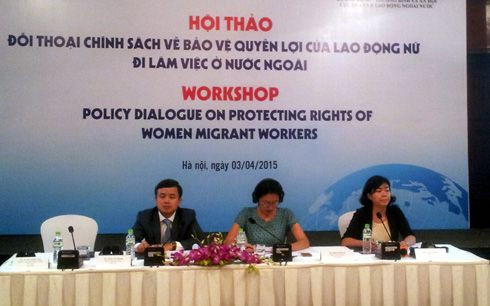Protecting the rights of female workers working abroad
The number of female workers going to work abroad is increasing, but there is currently no separate policy for them abroad.
Within the framework of the Project “Empowering Vietnamese women working abroad”, this morning (April 3), in Hanoi, the Department of Overseas Labor Management, Ministry of Labor, Invalids and Social Affairs in collaboration with the United Nations Entity for Gender Equality and the Empowerment of Women (UN WOMEN) organized a Policy Dialogue Workshop on protecting the rights of female workers working abroad.
Vietnam is a country with an increasing number of people working abroad in the Asia-Pacific region. Currently, 500,000 Vietnamese people are working in more than 40 countries and territories around the world.
Over the past 5 years, an average of 90,000 workers have been sent abroad each year, of which female workers account for 30 to 35% of the total number of migrant workers. The number of female workers working abroad is also on the rise. Specifically, in 2014, for the first time, Vietnam sent more than 100,000 workers to work abroad, with women accounting for 37.5%.
Vietnamese women go abroad to work, mainly in the following occupations: Housekeeper; Nurse; Hotel staff; Tailor; Weaver; Electronic equipment assembler in the markets of Taiwan (China), Korea, Malaysia, Japan, Saudi Arabia and the Republic of Cyprus. Like men, women who go to work abroad not only improve their professional knowledge, foreign language skills, experience and professional working style, but also bring in income to improve family life.
 |
Mr. Pham Viet Huong, Deputy Director of the Department of Overseas Labor Management, said: “The number of Vietnamese female workers working abroad contributes significantly to improving the living standards of families and localities. Along with promoting more effective organization and management of enterprises sending workers to work abroad, the Department of Water Resources Labor Management prioritizes focusing on measures to protect the legitimate rights and interests of Vietnamese workers working abroad. The Vietnamese Government also actively cooperates with the Governments of labor-receiving countries to protect the rights of workers.”
At the workshop, many delegates said that although the number of Vietnamese female workers working abroad is increasing, there is currently no specific policy for female workers working abroad. Current laws and policies apply to both male and female workers, and there are no special policies specifically for women.
Therefore, the difficulties and risks that women face when working abroad are often greater than those of men. Many women working abroad have been exploited, abused, subjected to violence, and not paid. When returning home, women also face difficulties in reintegrating and accessing services, especially services to support job placement. Due to heavy social prejudices and gender concepts, many women do not have the support of their families and relatives in raising their children when they return home from working abroad.
Ms. Shoko Ishikawa, Chief Representative of the United Nations Entity for Gender Equality and the Empowerment of Women (UN Women) in Vietnam, said: “Over the past 5 years, we have coordinated with the Department of Overseas Labor Management and relevant agencies of Vietnam to implement the Project “Empowering Women Working Abroad under Contract”. The project focuses on implementing many activities to improve knowledge about gender equality; strengthen the capacity of Vietnamese officials, managers and enterprises working to send workers to work abroad. We hope that through this project, policies and working methods in practice will change so that Vietnam can best ensure the rights of female workers working abroad”.
Opinions also suggested the need to supplement and improve policies for workers returning from working abroad to ensure gender principles. There needs to be coordination between relevant agencies in implementing specific incentive mechanisms and policies to encourage labor export enterprises to participate in supporting workers to reintegrate into the market; build a data system and information records of returning workers. In particular, there should be early interventions to minimize the risks that women may encounter when working abroad as well as when returning./.
According to VOV.VN






